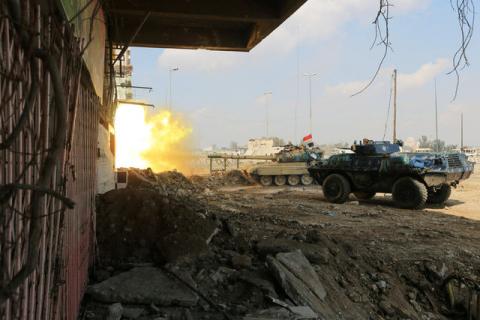Advertisement
Heavy fighting as Iraqi forces set sights on Mosul's Grand Mosque
MOSUL, Iraq (Reuters) - Government forces set their sights on reaching the Grand Mosque in Mosul's Old City on Wednesday and the prime minister said the battle to drive Islamic State from its last urban stronghold in Iraq was reaching its final stages.
Losing the city would be a huge blow to Islamic State as it has served as the group's de facto capital since its leader Abu Bakr al-Baghdadi proclaimed himself head of a caliphate spanning Iraq and Syria from the Grand Mosque in the summer of 2014.
Troops were also concentrating on capturing the Iron Bridge linking eastern Mosul with the Old City on the western side of the Tigris river, where Islamic State fighters are preparing to make a last stand.
Heavy fighting was reported around the Mosul Museum by journalists and combatants. An Islamic State suicide car bomb exploded near the museum.
The intense combat, much of it street-by-street, marked a decisive stage in the battle for Mosul which started on Oct. 17 last year.
As well as waging jihad in Iraq and Syria, the militants have also inspired attacks in cities in Europe, Africa and elsewhere that have killed hundreds of civilians.
"Our forces are advancing toward their targets. The main objective will be seizing the Iron Bridge and after that we will start an operation to seal off the area near the bridge to clear it from Daesh fighters," said a spokesman for the Interior Ministry’s Rapid Response units, one of the elite forces spearheading the offensive, using an Arab acronym for the group.
"We will be heading toward the old market in Bab al-Tob and advance deeper to reach the location of Mosul's Grand Mosque."
The capture of the mosque would be a huge symbolic victory as well as a concrete gain but that may take some time yet. The attacking forces faced sniper and mortar fire as well as the threat of suicide car bombs and grenade-dropping drones.
Iraqi officers said cloudy weather was hampering air cover on Wednesday morning.
Securing the Iron Bridge would mean Iraqi forces hold three of the five bridges in Mosul that span the Tigris, all of which have been damaged by the militants and U.S.-led air strikes.
In Baghdad, Prime Minister Haider al-Abadi said: "Daesh become day after day surrounded inside a tight area and they are in their final days."
"Speaking at a news conference on Tuesday night, he warned the insurgents that they must surrender or be killed although he also pledged to treat the militants' families fairly.
"Let me be very clear, we will preserve families of Daesh who are civilians but we will punish the terrorists and bring them to justice if they surrender," he said. "They are cornered and if they will not surrender they will definitely get killed.
"However, many hard days of fighting could still lie ahead as government forces try to make headway in the streets and narrow alleyways of the Old City. Islamic State fighters have booby-trapped houses, and government forces will also be fighting amongst civilians, ruling out the extensive use of air and artillery support.
Residents have streamed out of western neighborhoods recaptured by the government, many desperately hungry and traumatized by living under Islamic State's hardline rule.
As many as 600,000 civilians are still trapped with the militants inside Mosul. The Ministry of Immigration and Displacement said on Tuesday that in recent days, almost 13,000 displaced people from western Mosul had been given assistance and temporary accommodation each day, adding to the 200,000 already displaced.
Staff Brigadier Falah al-Obeidi of the Counter Terrorism Service (CTS) told Reuters his troops had taken control on Wednesday over the Dor al-Sikak and the al-Nafut areas, site of the militants' main weapons stores in Mosul just west of the Old City.
"Yesterday resistance was very strong in that area. It's where their stores are, and the people living there, both men and women, are with them (supporters or members)," he said.
Aerial surveillance photos showed women carrying guns.
CTS troops also brought in a Russian-made missile and two warheads. They had found 40 more such missiles stored in homes in Dor al-Sikak.
Government forces on Tuesday killed the military commander of the Old City, Abu Abdul Rahman al-Ansary, during operations to clear Bab al-Tob district, a blow to the militants, many of whose leaders having already retreated from Mosul.
Abadi said he would visit Washington next week and meet U.S. President Donald Trump to discuss the war. The United States is providing air, artillery and other support in the offensive.
(Additional reporting by Ahmed Rasheed in Baghdad; Writing by Angus MacSwan in Erbil; Editing by Louise Ireland)



















Add new comment